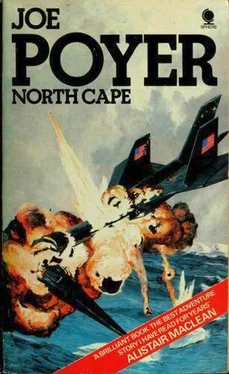Joe Poyer
NORTH CAPE

Fifty-eight degrees of frost. Twenty-six below zero F… From two hundred thousand feet, the surface of the earth below was void of all but the largest geological features. The land was a mixture of browns and grays, overlain with the misty white of a thin ice cover at sixty thousand feet. A barely discernible range of mountains stretched to the northeast beyond the narrow scope of vision allowed by the slit window. From this altitude, the lofty sixteen-thousand-foot peaks of the Urals appeared as softly rounded mounds almost lost in the sere browns of the surrounding plains. A thread of a river snaked down through, these plains from the narrow valleys and snowfields of the mountains and disappeared into the mist and cloud on the horizon. The land below spoke of peace and serenity; but the height obscured the hidden missile sites that could fling their deadly cargoes of thermonuclear death across continents and oceans; hid the military camps and bases scattered across the Asian mainland to meet the threat of enemies on two fronts.
The weather screen shifted focus to the northwest. Here the contrast was startling. Stretching far into the north of the continent and out across the Arctic Ocean, the northwestern swell of the Scandinavian Peninsula was covered with a huge storm that built even as Teleman watched. A hundred-mile-long streamer of cloud twisted around the tiny eye of the cyclonic storm sweeping down across the Great Barrier. All but the foremost edges of the storm were lost below the horizon, but in his imagination Teleman could picture the whole storm, covering five hundred thousand square miles on its leading edge, and God only knew how much in total. On the surface, one-hundred-milean-hour winds would be lashing the ocean into sixty-and seventy-foot waves to send them crashing onto the northern edges of the continental shelf. Salt spray blown off the crests of the waves would be turned instantly to ice and would batter to death all but the strongest ships that had the misfortune to be caught in the storm. This was an Arctic storm at its worst, a gale that could laugh at the puny efforts of the largest of its Mid-Atlantic and Caribbean cousins, a storm even more powerful and deadly than the coastal typhoons of the China Sea. For the next hour he would watch it grow through the forward observation slits and on his screen as he approached the Barents Sea. Lazily the pilot read the course plot and made a minor correction. He felt the plane bank over, the gulping ramjets running up with a steady murmur. He checked the instrument panels, all 573 dials, verniers, and digital readouts. Airspeed, course fix, engine temperature, fuel, contact point countdown, ambient temperature, internal temperatures in a hundred different locations throughout the aircraft, star fix coordinates, metal flex, accumulators, liquid oxygen generators, batteries, hydraulics, altitude, trim, generators, cameras, blood pressure, acid-base balance, pee; p°s, renal function, EKG… all checked themselves green on the boards.
Teleman — Major Joseph Teleman, USAF Ret — lay back in the acceleration couch and relaxed, suffused with the languid feeling of tranquilizers as the Physiological Control and Monitoring System (PCMS) accomplished its programed tasks and he was fully in control of his body again.
The airspeed indicated was slightly over Mach 1.5, with contact less than one hour away. The on-board computers had decided that he was fully capable of handling the aircraft at this relative crawl and had withdrawn all booster drugs. He settled back, one hand casually resting on the finger controls, and enjoyed the comfortable murmur of the engines and the passing scene below.
For the next twenty minutes the reconnaissance plane would drone on across the roof of Soviet Russia, skirting the Moscow antiaircraft missile defense ring by 250 miles, as it headed for the Barents Sea and rendezvous with the U. S. Navy battle cruiser that would accept the cargo of precious military information.
Above, traveling in overlapping polar orbits at six hundred nautical miles in carefully calculated paths that would circumscribe the earth every thirty minutes, a complex of Advanced SAMOS 3 satellites relayed information between one another and their ground point in Virginia. Shortly, the encoder on board clicked softly to itself and began displaying, in digital shorthand, information on a particularly suspicious ground location. One of the SAMOS 3 satellites had observed a small area of low-level infrared radiation where none had existed before. The location was in the vicinity of Magnitogorsk, the center of the Soviet electronics research.
Teleman smiled grimly. At last. He had been searching this entire mission for this patch of infrared as had his sister aircraft the week before. Word had been passed from the Defense Intelligence Agency of the sudden move of a very vital part of the new Soviet missile warhead countermeasures research operation. The testing location had been shifted for some unknown reason; perhaps it had something to do with the latest KGB announcement of a blown Western spy ring. Whether genuine or not, there was no way of knowing, but the fact remained that a large research installation had been moved, almost overnight it seemed. Thoughtfully, he programed the coordinates for his next sweep. Maybe the pieces of this little puzzle would finally begin to fall into place. But, for the remainder of this flight, it would be a milk run until he orbited the ship still a thousand miles north. Beneath his aircraft he could see the cloud-and snow-covered landscape of northern Russia turning black with its covering of pine. The forest, the taiga of Asian fame, stretched north for four hundred miles without a break — a last holdout of commercial enterprise in the — Soviet Union, the home of hundreds of fur trappers and family lumbering concerns, and the deathtrap into which whole divisions of the Moscow Army of the Nazi Wermacht had been lured to their destruction in the winters of 1942 and ’43.
Ahead, the terrain of Soviet Russia, slipping by the needle nose of the AR-17, was being covered by a heavy cloud layer. The cover thickened rapidly during the next ten minutes until a solid overcast was spread from horizon to horizon. Teleman reached forward and warmed up the infrared detectors and switched on the radar. The wide-scan radar beam knifed through the clouds to lay the pattern of the land below. Infrared came on-line moments later, laying a composite picture of heat patterns as it hunted through the lower frequencies to build a black and white image on the screen. The white, washed-out picture was quickly highlighted here and there with sharp black dots and patches as the warmer formations jumped out of the blizzard-and storm-covered ground below.
After a further ten minutes, an insistent code pattern containing airspeed and direction corrections appeared on the digital readout screen. Teleman altered course once more to suit the final rendezvous location. As the aircraft settled onto the new course, the cede pattern for rendezvous changed to that for the battle cruiser, his contact point for this portion of the mission. Still fifteen minutes short, he nevertheless began the check-out procedure on the transmission batteries.
Forty degrees of frost. Eight degrees below zero F at sea level. The nuclear-powered Robert F. Kennedy came around sharply, bows swinging into the crushing fury of a Force 11 wind, twin screws churning furiously as she clawed her way-up a towering wave rising nearly twenty feet above her superstructure, then rocketed down into the pounding waters of the trough. The bows smashed deep into green Arctic waters. Tons of water sprayed over her decks, mast-high, turning instantly to ice that rattled-against the bridge like cannon shot. What liquid, not frozen instantly in the frigid air, clung to the bridge, the shrouds, any exposed part of the ship, added yet another microlayer of ice o the tons already weighting her down. Again and again the ship smashed into the waves, each time rising half submerged from an encounter that would have sent lesser vessels to the bottom with all the careless thought of a glacier crushing a hillock beneath its advance.
Читать дальше













